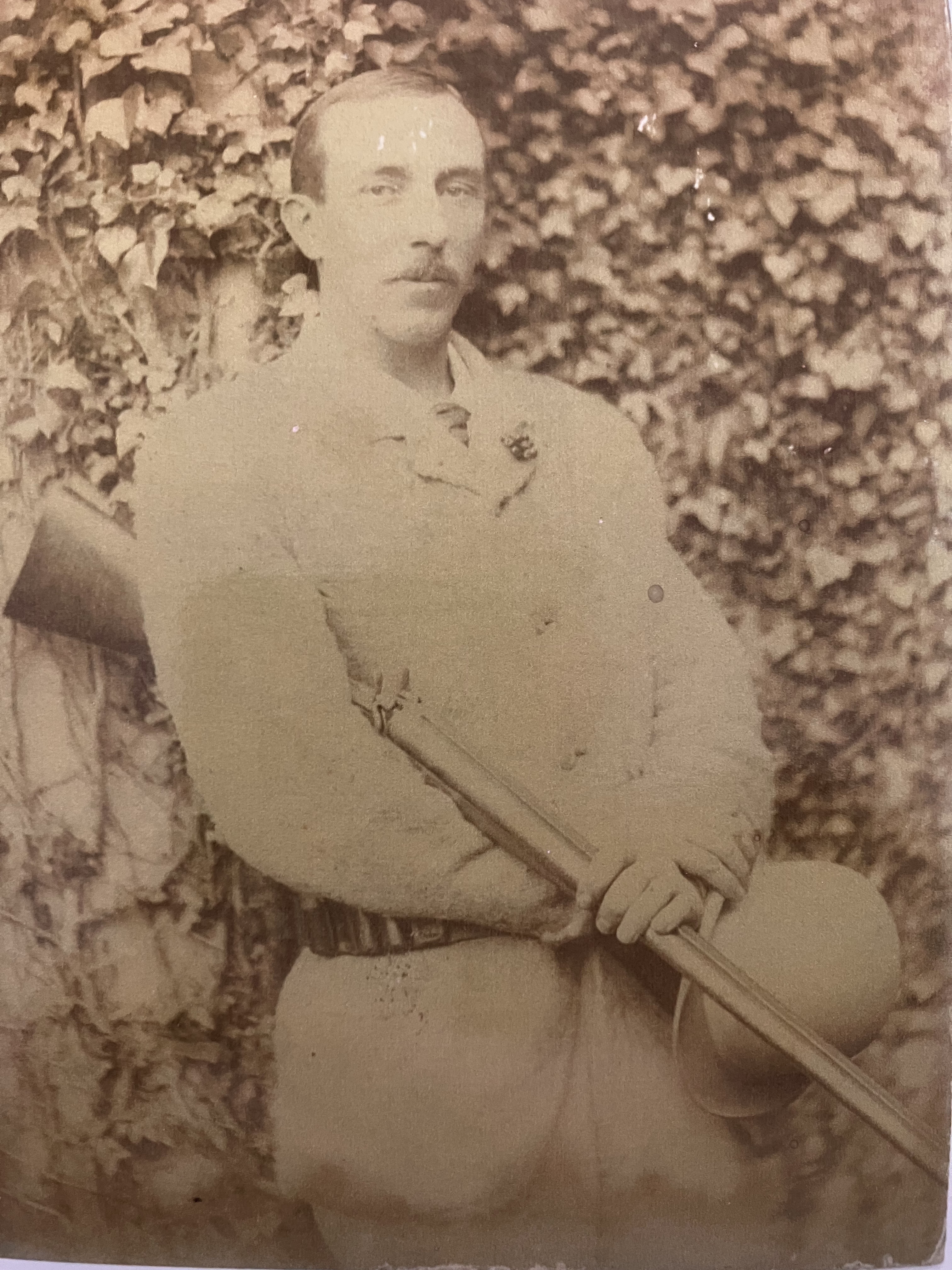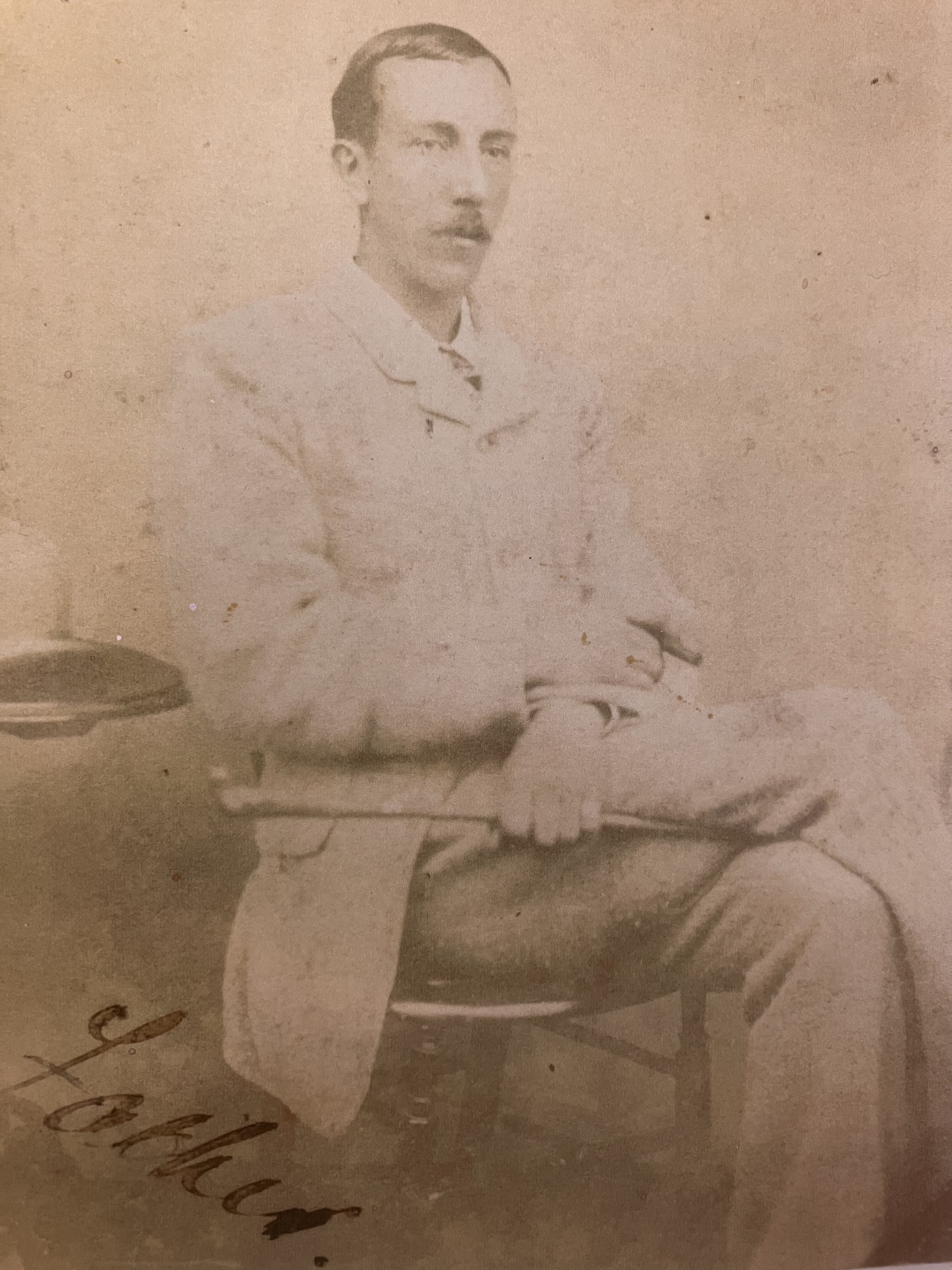In the 19th century, there were many amateur cricketers – and a few professionals – who lived their lives in a way which today we might consider unusual at best, or even downright strange. Several of these men played for Kent, but one of the most remarkable was William Wallace Rodger.
William Rodger was born in London on 13 January 1847, the son of Robert (later Sir Robert) and Sophia Rodger. Sir Robert earned his knighthood by being an assiduous JP and High Sheriff of Kent in 1865, by which time he had bought Hadlow Castle, near Tonbridge, as the family seat. Young William was educated at Eton and then at Exeter College, Oxford, where he played very many sports, without appearing to excel at any one in particular, apart from billiards, at which game he financed his student days by winning many bets, and played for Oxford against Cambridge twice. However, after leaving Eton in 1865 and before being called to the Bar in 1874, he spent much of each summer playing cricket for a number of Kent clubs, among them the Mote, Sevenoaks Vine, Tonbridge, Town Malling and Tunbridge Wells, and in doing so built a reputation as a useful batsman.

As a stylish, if not altogether brilliant, amateur bat, he attracted the attention of the Kent County Club, and his first first-class match, and his first game at Canterbury, was as a raw 18-year-old in August 1865, for the Gentlemen of Kent against the Gentlemen of M.C.C., a team that included E.M. Grace. Rodger batted at number 10, and scored 2, and did not bat in the second innings. He did not bowl and took no catches, but the Gentlemen of Kent won by four wickets. A year later Rodger, down from university for the Long Vacation, was picked again for the Gentlemen of Kent, against M.C.C. He still batted at number 10, did not bowl and took no catches, but exceeded his top score by making 4 in his only innings as his team won handsomely, by 8 wickets.
In July of the following year, while still an undergraduate who was nowhere near being picked for the University XI, he made his debut for Kent, against Hampshire, at Southborough. In the first innings, he was promoted to the heady heights of number 9, but in the second innings, with Kent needing just 23 to win the game, he was asked (or pushed his own cause) to open, and made 7, before getting out as Kent won by 9 wickets. He played two more games for the county that year, and improved his top score to 16..
In all, between 1867 and 1873, Rodger played 17 games for the county, generally batting higher up the order than number 9 or 10, but his top score, in a low scoring era, was only 32. Lord Harris, in his History of Kent County Cricket Club, somewhat condescendingly described Rodger as “a good long stop and a fair batsman”. In his final game, against M.C.C., he was dismissed in both innings by W.G. Grace, not a bad way to sign out of the first-class game. Overall, he scored 304 first class runs at an average of 9.21. The most exciting thing he did on the cricket field was probably when batting for Gentlemen of Kent against I Zingari in a non-first class game in Canterbury Week of 1873. The ball hit him on the leg, and rolled halfway down the pitch before coming to a halt. Rather than allow a fielder to pick it up and return it to the bowler, he sprinted up to it and hit it for four. Apparently, the umpires allowed it.

So far, so straightforward. Another moderately talented gentleman cricketer who made himself available through his social connections to play a few games for the county. But it was the rest of his life which set him apart from his peers.
Although he was called to the Bar in 1874, there is little evidence that he practised much law, at least not in Britain. His health was such that moved abroad for several years, although what the trouble was is not clear – weak lungs or signs of mental instability seem to have been the options. In 1874, he married a lady named Annie Kentfield in Brussels. They had a son, Robert and a daughter, Sophia. He gave his son and daughter his parents’ Christian names, either a sign of his love for his mother and father, or of his lack of imagination, or both. The marriage, however, did not last. William and Annie divorced in 1880 on grounds of Annie’s infidelity, a very unusual thing at the time, when even if divorce happened, it was usually the husband who took the blame – the only gentlemanly thing to do.
However, later reports seem to prove that Annie was a free spirit. Her divorce from William was granted on 20th January 1880 in the High Court of Justice, London, and on 2nd February, before a full month had elapsed after the decree, during which time divorced people were then not allowed to remarry, Annie married William Arthur Smith, presumably the man with whom she had committed adultery, on the island of Guernsey. By December 1888, things were not going well maritally for Annie yet again, so after eight years she decided to seek to annul the marriage, on the grounds that as divorce was not recognised in Guernsey in 1880, a divorced person in that island could not marry again. She won the annulment, and despite Annie being the law-breaking divorcee at the time of their marriage, costs were given against Mr. Smith, who was deemed to have lied to the priest about her marital past. Annie sounds like somebody to steer well clear of.
Now that William Rodger was free of Annie, he lived in Brussels for several more years, returning to England when his father died in 1882, and he inherited Hadlow Castle. Now he was back in England, he was becoming noted for his eccentric behaviour. Always a keen sportsman, he proposed what the Kent Times called “a challenge of a very unusual nature. He offered to swim, shoot, box, run and play billiards with any man in the county of Kent, while he also challenged his antagonist to debate any political question on a public platform. As far as we know, the challenge was never accepted.” But his propensity for accepting wagers of almost any type, the more eccentric the better, was becoming widely known.
When his mother died in 1887, he changed his surname to Rodger-Cunliffe, in order to inherit under the terms of her will, and shortly afterwards, in January 1888, he married for a second time, once again in Brussels. His wife, Jeanne Marie Wilhelmine Clementine Louise Felicie Schmedding, was a 21-year-old Dutch lady. He brought his wife (helpfully known informally as just ‘Jenny’) back to Hadlow and launched into a highly erratic final year of life.
He suddenly became deeply involved in politics. Having been a lifelong Conservative, he switched his allegiance to the Liberal Party and dived into local Liberal politics in a big way. By the time of his death, he was President of the Southborough Liberal Association and vice-president of the Tonbridge Central and District Liberal Associations. He was also chairman of the local Gas Company for good measure.
His religious fervour also increased. As the Kent Times reported, “His first introduction to the Salvation Army was of a somewhat singular nature. For a wager of some description, he had offered to interrupt a meeting at Hadlow, but his purpose was frustrated in an extraordinary way. He came to scoff, but, as the poet says, “remained to pray.” From that date (he) threw himself with great activity into the work of the Salvation Army, and took part in religious services under their auspices, and those of the Wesleyans, at his own home.”
The local papers reported that he had previously exhibited “some symptoms of mental derangement”. Despite such an erratic lifestyle, it was a sad end for him to be committed to Barming Heath Asylum, where he died, aged 41on October 23, 1888, after a brief illness, reported as inflammation of the lungs.
Yet the local press was effusive in its praise for William Rodger-Cunliffe. “The sad event being quite unexpected, much gloom has been cast over the neighbourhood.” “By a changed life, he was held in much esteem by his neighbours, while by his decease the poor of the district have lost one of their best friends”.
William Rodger-Cunliffe seems to have been what we would today call an entitled cad with more than a trace of instability, but at the end seems to have become a changed man, and a much better man for it. What’s more, his widow, Jenny, gave birth to his daughter a few weeks after his death. William Rodger-Cunliffe’s was a largely wasted life with, happily, some sort of redemption at the very end.
0 Comments